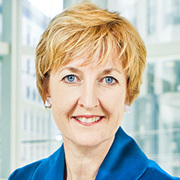
Linda Clark
Linda Clark's family migrated from England to New Zealand when she was a young girl. Christchurch raised, she completed the first year of a law degree at Canterbury University, before switching to english and politics. A postgraduate diploma in journalism led to work at the Manawatu Standard, the (now defunct) New Zealand Times and then the National Business Review in the heady pre-crash 80s — where she was a political reporter in the Parliamentary Press Gallery. "There was a lot of intellectual rigour about the place," she told The NZ Herald's Carroll du Chateau in 2002. "I was 23 and just like a sponge really."
In 1989 her screen career began, with a job as a researcher on current affairs show Frontline. In the fallout of 1990's controversial 'For the Public Good' episode, she asked to be transferred to TV One News and joined the political team. In 1992 she won a Qantas Media Award for Best Current Affairs Story.
For seven years from late 1993 she was the political editor for TVNZ in Wellington. Clark also presented late night and midday editions of One News. In 1996 she won another Qantas gong for a report on nuclear tests.
Fronting current affairs shows like Crossfire (1999) with Mike Hosking, and Face the Nation (2000), Clark forged a reputation as a formidable but respectful interviewer. The Herald's John Armstrong noted how Clark held Acting Police Commissioner Rob Robinson to account in a 2000 Face the Nation interview, following the Waitara shooting of Steven Wallace: "Words, words, words ... I'm sorry, I'm trying to understand that in plain English."
Yet Armstrong praised Clark's patience, for "giving him room to breathe where other interviewers might have constantly interrupted. Slowly, the bureaucratic mask began to slip. Robinson admitted the force was hurting over Waitara. Suddenly, television was giving us a glimpse of how the police, too, suffer after this kind of tragedy."
While continuing to present onscreen, Clark briefly edited Grace magazine in 2000. The lifestyle magazine folded eight months after she took the helm. Clark told du Chateau she was "gutted" about the demise, but proud of creating a "grown-up, sophisticated, nothing cheesy" women’s magazine.
In 2002 Clark left TVNZ to have twins. Post-partum she became a prominent presence on airwaves. A spot on Paul Holmes' NewstalkZB breakfast show preceded an appointment to Radio New Zealand’s Nine to Noon show. In 2004 she won the Qantas Media Award for Best News or Current Affairs Presenter.
In 2006, she quit broadcasting to resume her legal studies, provoking incredulity from colleagues. In a Listener interview that year she cited the unceremonious dumping of veteran broadcaster Judy Bailey as a prompt: "The media eats its own, unless you happen to be smart enough to sidestep into management where you are the one doing the eating. And I have no appetite for either end of the equation."
Clark juggled legal studies with part-time work at law firm Chapman Tripp, and the demands of raising twin boys. She also sporadically featured onscreen: in 2007 she provided political commentary on breakfast TV show Sunrise. In 2012, she combined her journalism and legal experience as host of the fourth season of TVNZ7's The Court Report. In publicity material for the show, Clark expressed satisfaction in being able to break through the legalese to make the legal system accessible.
In 2013 Clark joined Kensington Swan as a special counsel in their public law team. She also moderated TV3's The Vote, where teams of prominent Kiwis (led by Duncan Garner and Guyon Espiner) debated hot button current affairs issues.
Occasionally Clark has made headlines as a subject of the news, rather than its host. In 2014 allegations that she provided media training to former Labour Party Leader David Cunliffe provoked debate over conflict of interest with her role as a presenter for TV3. In 2015 she was hired to represent John Campbell amidst the turmoil of his eponymous current affairs show’s conclusion. And her 2006 career change made her a poster woman for mid-life reinvigoration.
After graduating in 2011, she told The Listener: "My career defines me but I didn’t want it to be defining point for them [her children] and their childhood. I wanted them to feel like I’m available to them and actually, availability is presence. … that’s the ultimate dilemma for women. You want to be home and to have a stimulating job, but to have a stimulating job, most of the time you need to be at work. ... so you have to work for employers who will accommodate that as best they can.”
Clark is a regular political commentator for TV3’s The Nation. She has been a member of the NZ Book Council, a judge for the Prime Minister's Education Excellence Awards, and chaired the NZ Organisation for Rare Disorders (NZORD).
Sources include
'Linda Clark' Saxton website. Accessed 24 February 2025
John Armstrong, 'TV: Linda Clark gives us something to chew on' (Review of Face the Nation) - The NZ Herald, 30 June 2000
Carroll du Chateau, 'Linda Clark wired for radio action' - The NZ Herald, 2 July 2002
Andrew McNulty, 'A new morning' (Interview) - The Listener, 28 January 2006
Fiona Rae, 'Changing careers? Look before you leap' (Interview) -The Listener, 7 April 2012
Writer unknown, 'Linda Clark to Host the Court Report' (press release) Dan News website. Loaded 16 March 2012. Accessed 29 November 2016